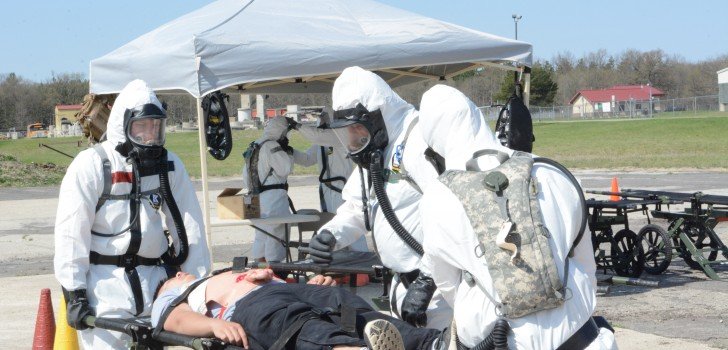Islamic State (ISIS) fighters have been confirmed to have used chemical weapons in an assault on an urban center in northern Syria on Friday.
On Tuesday, Medecins Sans Frontieres (MSF) said it had taken care of four members of a family who experienced breathing complications and developed skin burns after a mortar hit their compound in Marea.
The Syrian American Medical Society has also said that it has received 50 patients presenting signs and symptoms of exposure to chemicals.
Frontline militia in the region say the shells were fired from a village held by ISIS to the east.
A spokesperson for one militia, the Shami Front, said that 50 percent of the artillery rounds and 50 mortars which hit Marea contained sulphur mustard.
The strong irritant and blistering substance, which is regularly known as “mustard gas” but is liquid at room temperature, causes harsh skin damage, and irritation to the eyes and respiratory system.
MSF said the four victims, a couple and their five-day-old and three-year-old daughters, reported to one of its facilities an hour after the Friday evening assault in Aleppo province, experiencing respiratory difficulties, red eyes, inflamed skin and conjunctivitis. In about three hours they had blisters and their breathing difficulties got worse.
Personnel treated their signs and provided them with oxygen before referring them to another hospital for specialized treatment.
According to Pablo Marco, MSF’s program manager in Syria, “MSF has no laboratory evidence to confirm the cause of these symptoms”. He added, “However, the patients’ clinical symptoms, the way these symptoms changed over time, and the patients’ testimony about the circumstances of the poisoning all point to exposure to a chemical agent.”
On Monday, the Syrian American Medical Society stated that its hospital in Marea had admitted at least 50 civilians who presented similar signs. About 30 citizens had skin blisters, with medical personnel identified the agent to be sulphur mustard.
The medical organization stated that the samples had been taken from the clothing, hair and blood of patients as well from the shelling scene, to be examined.
Earlier in the month, the U.S. armed forces said they suspected ISIS of having utilized chemical substances in an assault on Kurdish troops in northern Syria. Reports of a chemical assault on Iraqi Kurdish Peshmerga militants in Iraq are also being evaluated.
U.S. officers recently argued that ISIS might have acquired the sulphur mustard from Syria, despite the administration announcing that all of its supplies had been destroyed as part of a disarmament agreement that came following a lethal sarin nerve agent attack in the periphery of Damascus on August 21st 2013.
Stay Connected